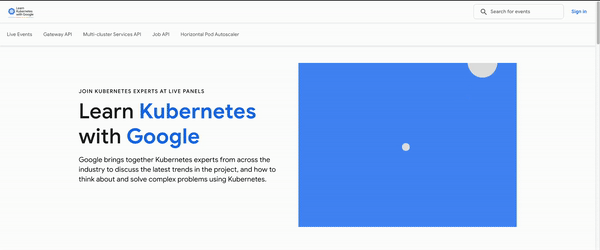Posted by Leticia Lago, Developer Marketing
Check out all the stories now at g.co/play/weareplay and stay tuned for even more coming soon.
 |
Posted by Leticia Lago, Developer Marketing
Check out all the stories now at g.co/play/weareplay and stay tuned for even more coming soon.
 |
As Kubernetes has become a mainstream global technology, with 96% of organizations surveyed by the CNCF1 using or evaluating Kubernetes for production use, it is now estimated that 31%2 of backend developers worldwide are Kubernetes developers. To add to the growing popularity, the 2021 annual report1 also listed close to 60 enhancements by special interest and working groups to the Kubernetes project. With so much information in the ecosystem, how can Kubernetes developers stay on top of the latest developments and learn what to prioritize to best support their infrastructure?
The new website Learn Kubernetes with Google brings together under one roof the guidance of Kubernetes experts—both from Google and across the industry—to communicate the latest trends in building your Kubernetes infrastructure. You can access knowledge in two formats.
 |
Join hundreds of developers that are already part of the Learn Kubernetes with Google community! Bookmark the website, sign up for an event today, and be sure to check back regularly for new content.
By María Cruz, Program Manager – Google Open Source Programs Office
The State of Cloud Native Development report by Slash Data, as cited on CNCF Annual Survey 2021 ↩
 Google Play reveals the 10 recipients of the Indie Games Fund, created to support small games studios in Latin America.
Google Play reveals the 10 recipients of the Indie Games Fund, created to support small games studios in Latin America.
 Check out ways you can use Google Assistant to easily spend time with loved ones this holiday season.
Check out ways you can use Google Assistant to easily spend time with loved ones this holiday season.
 More intuitive, sustainable, and accessible ways to explore and navigate during the holidays with Google Maps
More intuitive, sustainable, and accessible ways to explore and navigate during the holidays with Google Maps
 We’re announcing two new AR features on Google that make it easier to shop for foundation and sneakers.
We’re announcing two new AR features on Google that make it easier to shop for foundation and sneakers.
 Google’s third annual Black-owned Friday encourages consumers to support, search for and shop from Black-owned businesses.
Google’s third annual Black-owned Friday encourages consumers to support, search for and shop from Black-owned businesses.
Hi everyone! We've just released Chrome Beta 109 (109.0.5414.7) for iOS; it'll become available on App Store in the next few days.
You can see a partial list of the changes in the Git log. If you find a new issue, please let us know by filing a bug.
Erhu Akpobaro
Google Chrome
 Google for Education collaborated with research partner Canvas8 and advisor and consultant American Institutes for Research to conduct a global study in 24 countries on …
Google for Education collaborated with research partner Canvas8 and advisor and consultant American Institutes for Research to conduct a global study in 24 countries on …